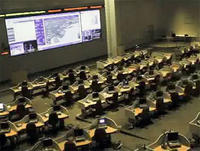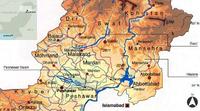-
House grills DHS for monitoring Twitter, Facebook
Earlier this year reports surfaced that DHS had awarded General Dynamic an $11 million contract to engage in monitoring of social networks; members of both parties including blasted DHS officials for potentially violating the First Amendment and collecting information on citizens engaged in protected political speech
-
-
FBI seeks system to monitor social networking sites

The FBI, seeking to monitor conversations on social networks like Facebook and Twitter, recently placed a request for information from technology companies to develop a system capable of automatically sifting through the torrents of “publicly available” data for keywords relating to terrorism, crime, and other matters of national security
-
-
GPS shoe helps track seniors with Alzheimer’s

For $300 consumers in the United States can now purchase a pair of GPS-enabled shoes to keep track of dementia-suffering senior citizens; after purchasing the shoes, buyers will have the ability to set up a monitoring service to locate lost family members who have Alzheimer’s disease
-
-
FBI limits GPS tracking following Supreme Court case
Following the recent Supreme Court ruling that required law enforcement agencies to have a warrant before they could use GPS tracking devices on a suspect, the FBI has begun scaling back on its use of electronic surveillance
-
-
Bipartisan panel calls for local emphasis in DHS intelligence

A new report by a bipartisan group of security experts argues that DHS should shift its intelligence gathering efforts away from foreign enemies and focus on local threats by working with law enforcement agencies and the private sector to secure critical infrastructure, the border, and cities from domestic threats
-
-
Innovative surveillance solutions recognized
MicroObserver Unattended Ground Sensor from Textron Defense Systems was recognized as one of the 2011 Big 25 intelligence, surveillance, and reconnaissance (ISR) products; the solution detects and tracks vehicles and personnel for perimeter defense, border security, force protection, persistent surveillance, and critical infrastructure protection
-
-
Columbine lessons helped thwart Tampa school tragedy

Police, having learnt the lessons of the 1999 Columbine High School massacre in Colorado, was in a better position to prevent violence in Tampa, Florida, last week; many school districts have threat assessment teams to try to connect the dots if there is a troubled, and potentially violent, student in their mix
-
-
DHS unveils new terrorism awareness ads
DHS secretary Janet Napolitano unveiled new television ads Wednesday for the public awareness campaign “If you see something, say something”; Napolitano said the videos are not intended to be alarmist, nor do they suggest only a vague threat, as did the security alert “color code” of years past
-
-
DHS's new terrorist database rankles privacy groups

A new DHS plan to create its own version of the FBI’s terrorist watch list that is exempt from the Privacy Act has privacy groups concerned; under the proposed plan, DHS would create the Watchlist Service which would bring the FBI’s suspected terrorist list in-house and expand on it
-
-
China's big surveillance push
In China’s latest push to keep tabs on its citizens, police in Beijing have ordered supermarkets and shopping malls throughout the city to install high-definition security cameras; the recent order comes as part of a broader expansion in monitoring technology which includes the addition of millions of surveillance cameras over the past five years and large increases in domestic security spending
-
-
Pakistani spies track immigrants in U.S.

Last week the indictment of two Pakistani-Americans pulled back the veil on the extent of Pakistan’s spy network in the United States; led by Pakistan’s military spy agency, the Directorate for Inter-Services Intelligence (ISI), the country’s efforts in the United States are primarily aimed at influencing lawmakers, keeping track of the Pakistani Diaspora, stifling dialogue critical of its military, and stymieing India — the country’s chief rival
-
-
Designing a more effective crystal ball
A new model for crowdsourcing predictions called Aggregative Contingent Estimation System (ACES) is transforming the way future events are forecast — combining the collective knowledge of many individual opinions in a unique way that improves accuracy beyond what any one person or small group of experts could provide
-
-
Researchers tout efficacy of reporting suspicious activity in foiled terror plots
Following the death of Osama bin Laden and with fears of a retaliatory attack on the rise, public policy researchers are touting the efficacy of the new “See Something Say Something” campaign which encourages individuals to report any suspicious activity they see; of the sixty-eight stopped terrorist attacks from 1999 to 2009, nearly 40 percent of the plots were stopped following a report of suspicious activity; critics say that the “See Something Say Something” campaign inundates law enforcement officials with tips that could take valuable time and resources from real investigations
-
-
7/7 attacks could not have been prevented: report

An inquest into the 7 July 2005 attack on London transportation concluded that any suggestion MI5 could have stopped the attacks was “based to a considerable extent on hindsight”; there were failures in the response by emergency workers — confusion, a shortage of first aid supplies, and radios that did not work underground, but the report concludes that government errors had not increased the death toll
-
-
Geographers predicted bin Laden's hideout location

They do not work for the CIA or military intelligence, but undergraduate students at UCLA two years ago helped develop an analytical tool which allowed them to predict Osama bin Laden’s hiding place — well, almost predicted: their model said that there was a 80.9 percent chance that bin Laden was hiding in the town of Abbottabad, where he was killed on Sunday by U.S. special forces; the students used a theory called “island biogeography”; the theory says that species on large islands are much more likely to survive a catastrophic event than species on small islands; “The theory was basically that if you’re going to try and survive, you’re going to a region with a low extinction rate: a large town,” says the professor who guided the research
-
- All
- Regional
- Water
- Biometrics
- Borders/Immig
- Business
- Cybersecurity
- Detection
- Disasters
- Government
- Infrastructure
- International
- Public health
- Public Safety
- Communication interoperabillity
- Emergency services
- Emergency medical services
- Fire
- First response
- IEDs
- Law Enforcement
- Law Enforcement Technology
- Military technology
- Nonlethal weapons
- Nuclear weapons
- Personal protection equipment
- Police
- Notification /alert systems
- Situational awareness
- Weapons systems
- Sci-Tech
- Sector Reports
- Surveillance
- Transportation
Advertising & Marketing: advertise@newswirepubs.com
Editorial: editor@newswirepubs.com
General: info@newswirepubs.com
2010-2011 © News Wire Publications, LLC News Wire Publications, LLC
220 Old Country Road | Suite 200 | Mineola | New York | 11501
Permissions and Policies
Editorial: editor@newswirepubs.com
General: info@newswirepubs.com
2010-2011 © News Wire Publications, LLC News Wire Publications, LLC
220 Old Country Road | Suite 200 | Mineola | New York | 11501
Permissions and Policies
